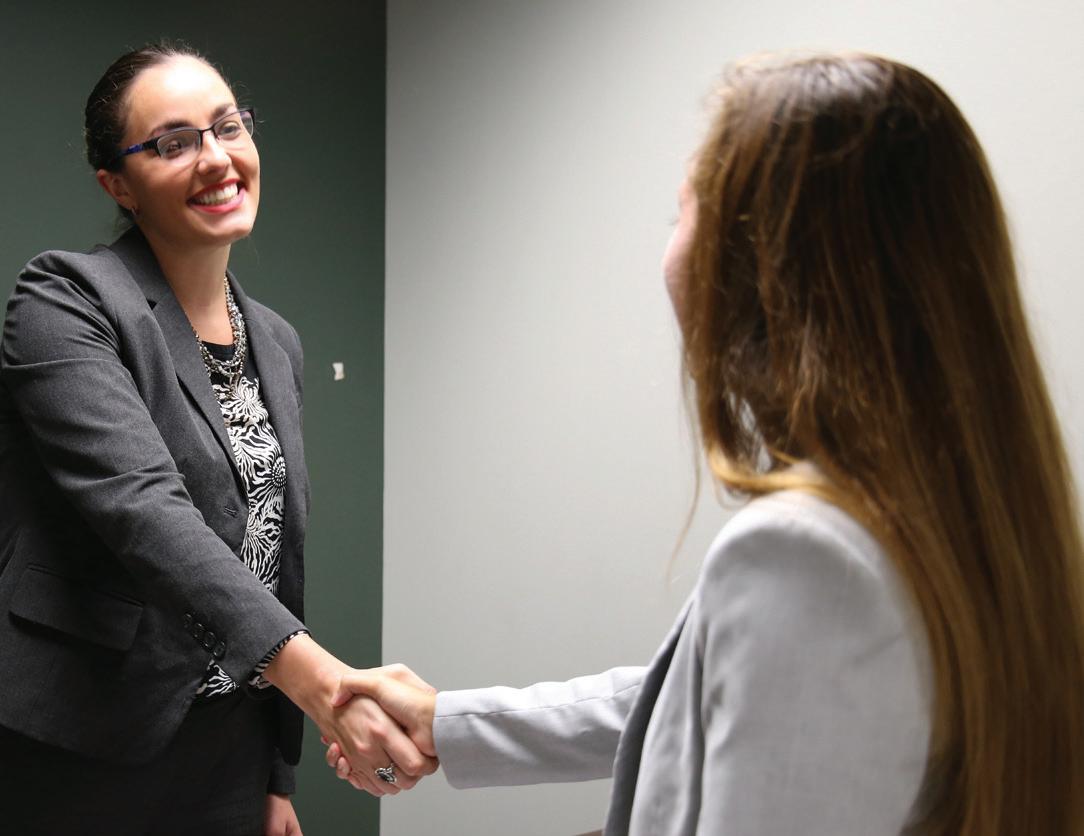ACE THE INTERVIEW BEFORE THE INTERVIEW Be On Time
COMMON INTERVIEW QUESTIONS • What are your short- and long-term goals and objectives?
It is better to be a few minutes early than one minute late for your interview. Arrive 10-15 minutes early to ensure ample time. If you are late, you will make a bad initial impression.
• What do you see yourself doing five years from now?
Dress Appropriately
• How do you think a friend or professor who knows you well would describe you?
When seeking a professional position, you must look like a professional. For more on business dress, read how to dress to impress on page 29.
Anticipate the Interview Format The interview format can vary depending on the organization, position, resources available, etc. When you set up an interview appointment, be sure to ask which format will be used and, if possible, who will be present (names, position titles, departments represented). Potential interview formats include: • One-on-one: One interviewer, one candidate for one interview.
• What are your greatest strengths and weaknesses?
• Why should I hire you? • What do you know about our organization? • Describe an example where you worked as part of a team. • Tell me about a time when you motivated others. • Describe a situation when you underwent significant stress. How did you cope?
ADDITIONAL QUESTIONS
• Panel interview: A group of interviewers take turns asking questions to one candidate.
• What are the most important rewards you expect in your career?
• Group interview: Several candidates interview at the same time with one or more interviewers.
• What motivates you to make your greatest effort?
• Zoom/telephone interview: An interview in any of the above formats but held using technology (computer with webcam, or telephone).
• What qualifications do you have that will enable you to be successful in this field?
• Performance interview: Candidate performs specified tasks related to the potential job in a limited timeframe.
• In what ways do you think you can make a contribution to our organization?
• Case or technical interview: See your Career Liaison for assistance with industry-specific interviews. To view drop-in hours for your college’s Career Liaison, visit career.fsu.edu/hours. Some interviews might include stress questions, which usually involve problem solving and have no right or wrong answers. The purpose of this type of questioning is to see how you think and react under pressure. Visit The Career Center Library for sample stress questions. In other situations, especially academic settings, you may be asked to lecture or present in your area of expertise in addition to participating in other kinds of interviewing. Some interviews last 30–45 minutes. In other organizations, interviews are conducted in a series covering one or more business days. Knowing the format in which you will be participating will help you prepare and perform on the day of the interview.
32
The Career Guide 2021-2022
• How do you determine or evaluate success?
• Describe the relationship that should exist between a supervisor and employee. • What two or three accomplishments have given you the most satisfaction? • What have you learned from your previous jobs or extracurricular activities? • In what kind of work environment are you most comfortable? • How do you work under pressure? • Why did you decide to seek a position with this organization? • What do you feel is the most pressing issue facing our industry today? • What major problem have you encountered, and how did you deal with it?























